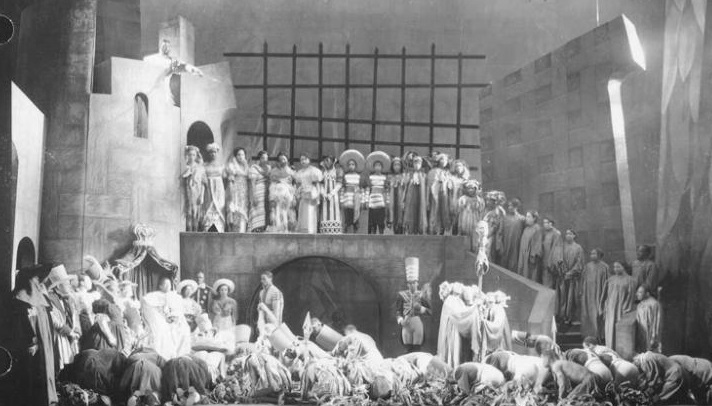There is no more important time for the arts than during a crisis. When people are economically destitute or psychologically troubled, theatre, art and music can uniquely uplift them. Free from political overtones, art has the capacity to breach all divides. It has the potential to restore faith in humanity when it may be found wanting.
Executive director of the US Modern Language Association Prof. Paula M. Krebs wrote about this in an article titled “Why we need a new WPA”, published by CNN. Describing the critical role of President Franklin Roosevelt’s Work Progress Administration (WPA), which employed thousands of workers to build critical infrastructure such as bridges and roads, she says: “But the WPA also employed writers, researchers, historians, artists, musicians, actors and other cultural figures—and the work they did had as profound and lasting impact on the nation as the bridges and roads”.
With countless workers currently unemployed from within the fields of the arts and humanities, she states, “this moment calls for a new WPA that employs those with humanities expertise in partnership with scientists, healthcare practitioners, social scientists, and business, to help shape the public understanding of the changes our collective culture is undergoing”.
Those workers would have a critical role in documenting the history of this unique period; documenting the transformations that are occurring and the differing approaches to the crisis taken by various nations; helping to make sense of the psychological changes experienced by the population during the crisis, and of the ethical challenges faced by medical staff working with inadequate resources; working with economists to confront class and racial divides exacerbated by the crisis; and uplifting the isolated and unemployed, depressed or grieving masses.
“The WPA arose from a commitment to provide meaningful work that was good for the country, ravaged by the Depression, and so must any new WPA”, wrote Krebs. What many don’t realise, however, is that it included a Federal Theatre Project (FTP), a Federal Writers’ Project (FWP) and a Federal Music Project (FMP). The theatre project employed some 13,000 actors, playwrights and theatre professionals and led to new initiatives such as a controversial all-black staging of Shakespeare’s Macbeth by the FTP’s Negro Theatre Units. The FWP employed writers, editors and researchers, resulting in a historic collection of 2,300 stories. The FMP shaped a notable public appreciation for music, enriching the lives of many thousands of Americans.
“How many people are feeling unmoored by their isolation, and are trying to learn how to get their entertainment from a screen instead of through interpersonal interaction?” Krebs asked. “What happens to families when you can no longer visit the grandparents?”
Krebs continued: “With a new WPA for the humanities comparable to its New Deal predecessor, scholars and teachers could fan out into social services organisations, health care settings, public schools, and private industry as writers and researchers and as analysts of policy, text, and data. They could collect narratives of the unemployed, the service workers, the workers-from-home. They could trace the histories of the business districts that disappear, compare our current situation with other nations, and highlight and contextualise the ethical dilemmas faced by health care workers with scant resources. Humanists’ work would become better understood as central to who we are and can be as a nation.
“A WPA for 2020 would bolster our country’s ability to imagine a future. That future need not be either a return to a pre-COVID-19 past or an unthinking adoption of the changes caused by the disease to our working and living conditions. But it will take a combination of science, business, and the humanities to fully envision that future. Science alone, it is clear, cannot do it. Nor can economics or politics.
“To get us through the darkest moment of the American economy”, Krebs concluded, “FDR and the architects of the New Deal knew we needed the humanities. We need them again.”
The German “poet of freedom”, Friedrich Schiller (1759- 1805), theorised on these notions in his 1794 letters On the Aesthetic Education of Man. He pointed to the lack of “moral” education as a critical shortcoming in the period of great opportunity of his time, the French Revolution. The objective condition for political change existed, but the subjective moral condition to make it happen was lacking. His observation that both the “barbarism” of the oligarchy and the “savagery” of the uneducated population must be tackled to produce an economic and cultural renaissance, led him to develop his ideas on the necessity of aesthetical education. In the absence of inspiring leadership—as is certainly the case today—an improvement in politics must come through the ennoblement of the individual by means of great Classical Art, he wrote. Only art can “open up wellsprings which will keep pure and clean throughout every political corruption”. One who is touched by the beauty and power of a great composition or performance is able to harness that power, which stays with him. Art demands that the subject bring reason and emotion together in a “completeness of character”, and thus the scope of the identity is enlarged and strengthened. It is then possible to improve the moral, and therefore the political, condition of man.









